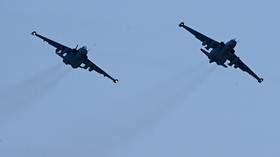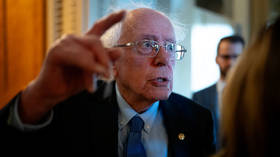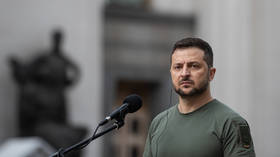US government warned about sanctions blowback

Sanctions have become an “increasingly prominent tool of US statecraft,” experts from the think tank International Crisis Group (ICG) have observed, warning that Washington’s overreliance on this method has prompted concern over its collateral effects, particularly in regard to efforts at peacemaking.
In an article published on ICG’s website earlier this week, the organization stated that despite US efforts to mitigate the problems caused by sanctions by adopting new policies, such reforms have been incomplete. As the Biden administration shows no signs of “taking its foot off the gas” when it comes to applying sanctions, their downsides are becoming far-reaching and ever more pressing, according to the Brussels-based nonprofit.
“They can inhibit peace processes and post-conflict recovery, constrain peace organizations, undercut negotiations and entrench divisions between conflict parties,” the ICG experts said.
The report goes on to outline three main reasons why US-led sanctions pose an obstacle to peace. The first is that they are hard to change, to ease or to lift, because of domestic politics and bureaucratic inertia. The second is that Washington has no means of comprehensively assessing the harm or effectiveness of applied sanctions and cannot gauge whether they are having the intended effect. Lastly, ICG’s analysts note that US sanctions have become increasingly complex and intertwined, which has made them difficult to disentangle or to reform.
The use of such trade restrictions has also become “less likely to sway conflict parties, who have no faith that the penalties will be lifted –or the effects alleviated– if they make concessions,” its report noted.
To alleviate these issues, the authors recommend that the US government make it a habit to clearly define the objectives sanctions are meant to achieve, create systems for reviewing sanctions’ performance, expand carveouts and better address private-sector reluctance to engage with sanctioned or previously sanctioned countries.
“As it stands, sanctions too often impede talks, hinder conflict resolution efforts and post-conflict recovery, and limit the work of peace organizations, including those working to advance US policy goals, often with US funding,” the report concluded, calling for a concentrated commitment to reform such policies.
ICG’s report comes as the US has countless sanctions imposed on countries across the world, including on Russia following the recent outbreak of fighting in the years-long conflict in Ukraine. Washington claimed that the trade restrictions would cripple the Russian economy, however, the measures have failed to achieve the desired result.
Russian leaders have instead claimed that the country has fully overcome the economic downturn caused by Western restrictions and that it has “good” prospects for rapid development.













